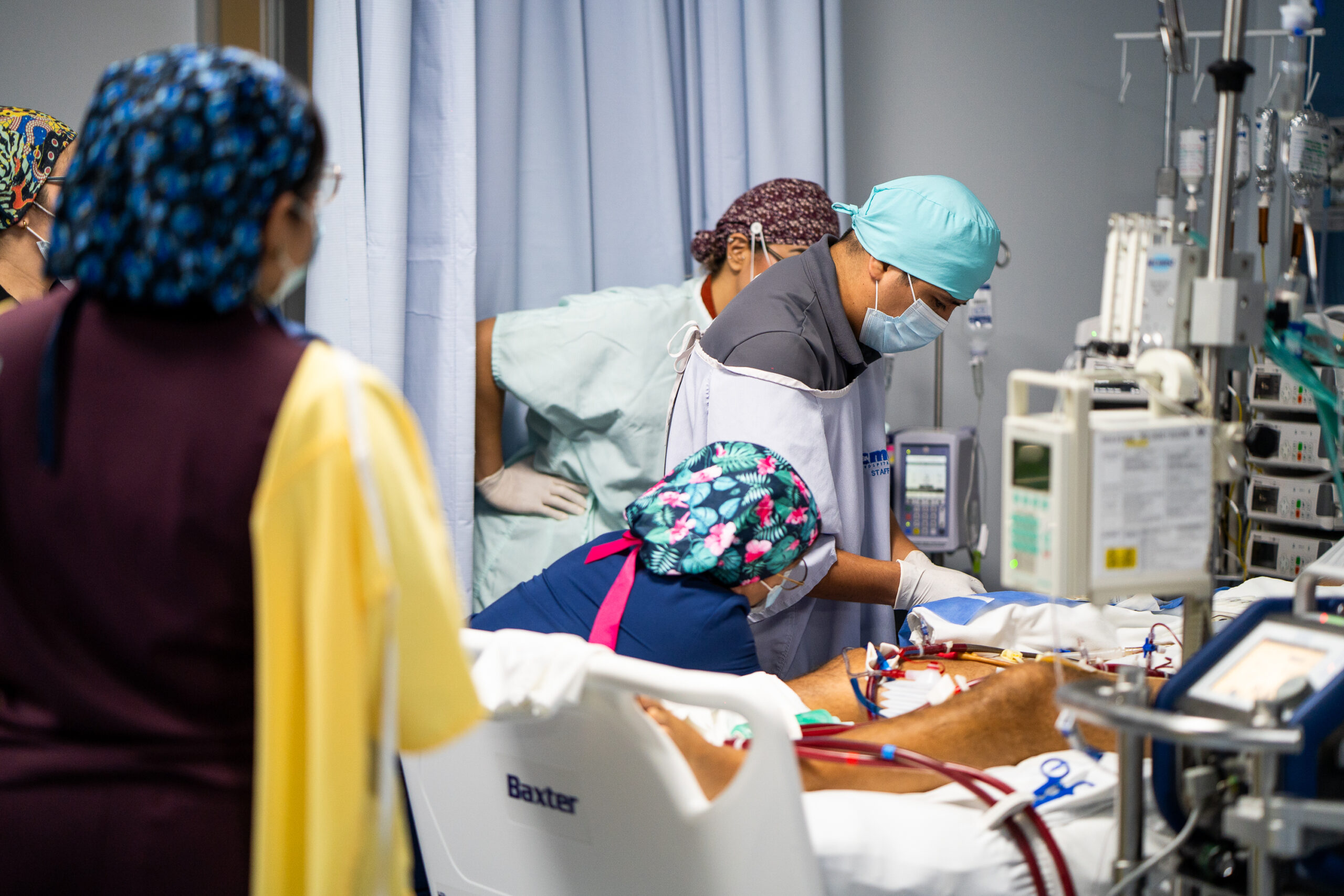A New Era in Cardiac Surgery: The First Bentall Procedure in Puerto Vallarta
Advanced Heart and Vascular Care at Hospital CMQ Riviera Nayarit
For the first time in Puerto Vallarta, Hospital CMQ’s cardiothoracic surgery team successfully performed a Bentall procedure, a complex and highly specialized cardiac surgery. This achievement represents a historic milestone in the region’s cardiovascular care. In particular, the procedure was led by Dr. Fernando Carrillo Llamas and Dr. Julio César Bojórquez Ramos, supported by a multidisciplinary team of cardiologists and intensivists at Hospital CMQ.
This intervention, which demands millimeter-level precision and seamless teamwork, marks a new chapter for high-specialty medicine in Bahía de Banderas.
Overview | Bentall Procedure in Puerto Vallarta
- What is it?: The Bentall procedure is an advanced cardiac surgery that replaces the aortic root and valve while reimplanting the coronary arteries. It’s typically performed in severe cases of aortic aneurysm or damage.
- How is it performed?: The damaged aortic root is replaced with a prosthetic graft containing an artificial valve, and the coronary arteries are reattached with surgical precision.
- Where was it performed?: At Hospital CMQ Riviera Nayarit, a leading institution in cardiovascular and cardiothoracic care.
- Who participated?: The procedure was led by Dr. Fernando Carrillo Llamas and Dr. Julio César Bojórquez Ramos, supported by a multidisciplinary team of cardiac surgeons, intensivists, and ECMO specialists.
What Is the Bentall Procedure?
The Bentall procedure is an advanced surgical technique designed to replace the heart’s aortic root and valve while reconnecting the coronary arteries. It’s primarily indicated for life-threatening conditions such as aortic aneurysms or infective endocarditis that compromise the integrity of the aortic root.
During the surgery, the affected portion of the aorta is removed and replaced with a prosthetic graft containing a new valve. Subsequently, the coronary arteries are carefully reimplanted. Due to these facts, this complex procedure requires expert technical skill, precision, and a highly coordinated surgical team.
A High-Precision Surgery: When Is the Bentall Procedure Indicated?
This surgery is indicated for patients with severe aortic root diseases, such as aneurysms or infections like endocarditis that affect normal heart function. In addition, it may be required when the aortic valve is irreparably damaged. Performing the Bentall procedure requires advanced hospital infrastructure and state-of-the-art cardiac surgery equipment. Furthermore, an extracorporeal life support system like ECMO (Extracorporeal Membrane Oxygenation) is needed to assist heart and lung function during and after surgery.
A Breakthrough in Cardiovascular Medicine in Puerto Vallarta
The successful completion of the first Bentall procedure at Hospital CMQ Riviera Nayarit marks a historic breakthrough in the history of the region’s cardiovascular medicine. Thanks to our ongoing investment in technology, innovation, and continuous medical training, patients with complex heart conditions can now receive specialized, world-class treatment in Puerto Vallarta without needing to travel to major metropolitan centers.
The First Bentall Procedure at Hospital CMQ Riviera Nayarit
The Clinical Case and the Team Behind the Success
The patient, a 67-year-old man diagnosed with acute infective endocarditis and a periaortic abscess, was initially admitted to Hospital CMQ Premiere under the care of cardiologist Dr. Leslie Swindle. Given the severity of his condition, he was transferred to Hospital CMQ Riviera Nayarit, where our cardiothoracic surgery team assumed his care. The surgery was led by Dr. Fernando Carrillo Llamas and Dr. Julio César Bojórquez Ramos, lasting over ten hours and requiring precise coordination among multiple specialists.

After the Bentall Procedure: Recovery and ECMO Support
Following surgery, the patient was admitted to the Intensive Care Unit at CMQ Riviera Nayarit, where he received ECMO therapy (Extracorporeal Membrane Oxygenation) in Veno-arterial (VA-ECMO) mode. In particular, the Veno-arterial ECMO is an advanced life-support technique that temporarily replaces the function of both the heart and lungs, oxygenating and circulating the blood outside the body while allowing these organs to rest and recover. As such, this modality is primarily used for patients with severe cardiac and respiratory compromise, providing essential hemodynamic and respiratory support during their stabilization and recovery.
This specialized treatment was provided by a team of experts, including Dr. Nuria Ayala, Dr. Cinthia Martínez, Dr. Leonel Molina, Dr. Graciela Gómez, Dr. David Hernández, and Dr. Fernando Herrera. Thanks to the timely management and the coordinated work of our ECMO-certified multidisciplinary team, the patient is now in stable condition and showing significant improvement.
Hospitals CMQ: Innovation and Commitment to Medical Excellence
At Hospitals CMQ, medical innovation meets compassion and dedication. The first Bentall procedure in Puerto Vallarta not only demonstrates our team’s technical expertise but also reinforces our mission to deliver world-class medical care to every patient. We are committed to advancing high-specialty medicine in the region, strengthening our Cardiology, Cardiothoracic Surgery, and Intensive Care departments to continue saving lives.
Frequently Asked Questions About the Bentall Procedure
It is a cardiac surgery that replaces the aortic root and valve while reimplanting the coronary arteries. It’s used to treat serious conditions that affect the aorta.
Like any major surgery, it carries risks such as bleeding, infection, or cardiac complications. However, when performed by specialized teams, success rates are high.
At Hospital CMQ Riviera Nayarit, the first hospital in the region to successfully perform the Bentall procedure.
Patients with aortic aneurysms, infective endocarditis, or severely damaged aortic valves that cannot be repaired through other procedures
Unlike standard valve replacement, the Bentall procedure replaces the entire aortic root and requires the reimplantation of coronary arteries, making it a highly complex and specialized operation.
Recovery varies, but patients usually remain hospitalized for at least seven days, followed by weeks of cardiac rehabilitation and follow-up care.
When performed by experienced cardiothoracic teams, the procedure has a high success rate, with excellent long-term outcomes for most patients.




